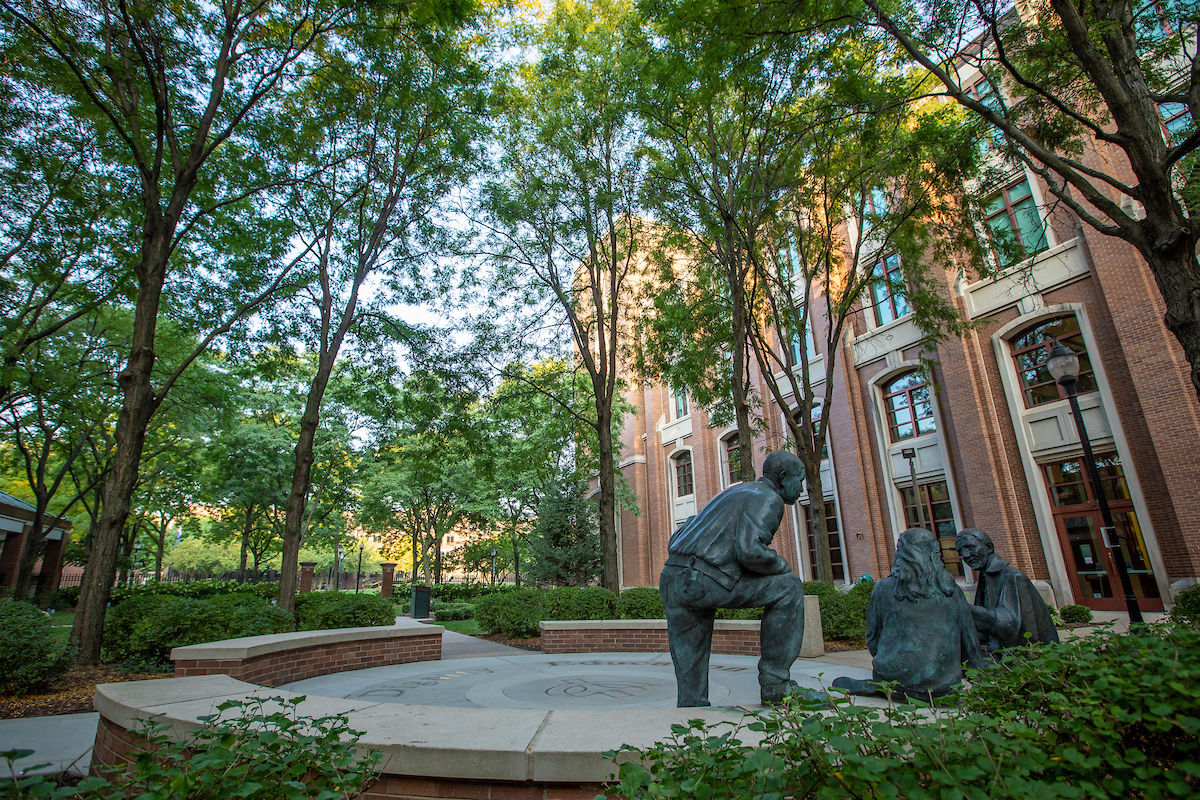 (DePaul University/Jeff Carrion)This fall, DePaul welcomed Martin Luther Boston as its 2020-21 Ida B. Wells-Barnett Postdoctoral Fellow in the Department of African and Black Diaspora Studies. An expert in South Africa, exile, and comparative racial politics and history, Boston will teach several courses throughout the academic year. This winter, he will teach “Black Freedom Movements" and “African America: Ideas, Peoples, Cultures."
(DePaul University/Jeff Carrion)This fall, DePaul welcomed Martin Luther Boston as its 2020-21 Ida B. Wells-Barnett Postdoctoral Fellow in the Department of African and Black Diaspora Studies. An expert in South Africa, exile, and comparative racial politics and history, Boston will teach several courses throughout the academic year. This winter, he will teach “Black Freedom Movements" and “African America: Ideas, Peoples, Cultures."
“The African and Black Diaspora Studies department is excited to add someone of Professor Boston's caliber to our faculty this year," says Amor Kohli, chair of the Department of African and Black Diaspora Studies. “We are fortunate that we can continue to nurture and support promising young scholars like him."
A product of the San Francisco Bay Area and spoken word artist completing his first novel, Boston will host the upcoming virtual lecture,
“Reparations and Reconciliation: Lessons for the U.S. from Post-Apartheid South Africa," on Oct. 15. The lecture will examine the pros and cons of how South Africa instituted attempts at repair and will highlight them in the context of the United States today.
 Martin L. Boston, 2020-21 Ida B. Wells-Barnett Postdoctoral Fellow in the Department of African and Black Diaspora Studies.
Martin L. Boston, 2020-21 Ida B. Wells-Barnett Postdoctoral Fellow in the Department of African and Black Diaspora Studies.
Can you tell us about your research?
My research and teaching interests are in South Africa, exile, cultural producers and production, pan-Africanism, Black internationalism, and comparative racial politics and history. I am particularly interested in South Africa's exile period (1960-1994), U.S.-South African comparative history, apartheid and segregation, as well as Black South African and Black American cultural producers.
My dissertation, “Be(Long)ing: New Africanism & South African Cultural Producers Confronting State Repression in an Era of Exile," focuses on exile. It studies the practice as a function of government control and as an avenue through which South African cultural producers and creative works became active in the politics of various countries around the world.
What drew you to DePaul and the Ida B. Wells-Barnett fellowship?
The Department of African and Black Diaspora Studies has an exceptional reputation as a leading department in the study of the Black Diaspora. The faculty, staff and students that make up this department are renowned, and I wanted to be a part of this illustrious community.
Moreover, this position being named in the honor of Ida B. Wells-Barnett, who was a courageous and genius journalist, activist and researcher in the late 1800s and early 1900s, illustrates the importance and status of this award. I am humbled to be among the scholars who have won this award before me and to walk in the giant shadow of Mrs. Wells-Barnett, who devoted her life to fighting racism, sexism and racialized and gendered violence and terror.
What do you hope to accomplish during your time at DePaul?
This prestigious award allows me to share my scholastic expertise with the DePaul community teaching three courses over the winter and spring quarters. However, I am also afforded the opportunity to work with the amazing scholars and academic community in ABD, particularly, and DePaul generally. During the course of this year I will be involved in numerous campus initiatives, research projects of my own, and student outreach.
I hope to benefit from the exceptional academic community, both as a teacher and colleague, in the development of my scholarship and pedagogy. I also hope to publish two academic articles based on my research during the course of this academic year.
You mentioned student outreach. Can you tell us about your plans?
I plan to hold reading groups for fiction readers or creative writing groups for students interested in working on their non-academic and creative interests.
It helps students find moments of joy within often overly completive and rigorous academic environments. These moments of joy can help with self-esteem and can relieve stress and anxiety, which in turn allow students to be better and more focused in the classroom.
Register for Boston's
Oct. 15 lecture here.